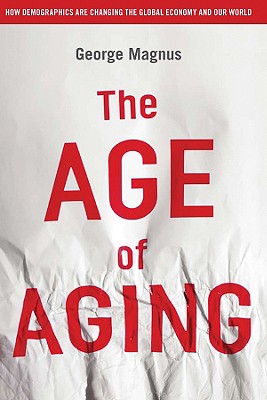

 Wiley
Wiley
The Age of Aging: How Demographics Are Changing the Global Economy and Our World


Key Metrics
- George Magnus
- Wiley
- Hardcover
- 9780470822913
- 9.2 X 6.3 X 1.3 inches
- 1.4 pounds
- Business & Economics > Economics - Macroeconomics
- English
 Secure Transaction
Secure TransactionBook Description
The Age of Aging explores a unique phenomenon for mankind and, therefore, one that takes us into uncharted territory. Low birth rates and rising life expectancy are leading to rapid aging and a stagnation or fall in the number of people of working age in Western societies. Japan is in pole position but will be joined soon by other Western countries, and some emerging markets including China. The book examines the economic effects of aging, the main proposals for addressing the implications, and how aging societies will affect family and social structures, and the type of environment in which the baby-boomers' children will grow up.
The contrast between the expected old age bulge in Western nations and the youth bulge in developing countries has important implications for globalization, and for immigration in Western countries - two topics already characterized by rising discontent or opposition. But we have to find ways of making both globalization and immigration work for all, for fear that failure may lead us down much darker paths. Aging also brings new challenges for the world to address in two sensitive areas, the politicization of religion and the management of international security. Governments and global institutions will have to take greater responsibilities to ensure that public policy responses are appropriate and measured.
The challenges arising within aging societies, and the demographic contrasts between Western and developing countries make for a fractious world - one that is line with the much-debated 'decline of the West'. The book doesn't flinch from recognizing the ways in which this could become more visible, but also asserts that we can address demographic change effectively if governments and strengthened international institutions are permitted a larger role in managing change.
Author Bio
George Magnus is an independent economist and commentator, and Research Associate at the China Centre, Oxford University, and at the School of Oriental and African Studies, London.
George was the Chief Economist, and then Senior Economic Adviser at UBS Investment Bank from 1995-2012. He had a front row seat and key managerial position for multiple episodes of boom and bust in both advanced economies and emerging markets, including notably the Great Financial Crisis of 2008. George famously anticipated it in 2006-2007 with a series of research papers in which he warned of an impending Minsky Moment. Whilst at UBS, he served for four years as the Chair of the Investment Committee of the pension and life assurance fund. For four years until 2016, he served finally as an external senior adviser with clients of the investment bank.
He had previously worked as the Chief Economist at SG Warburg (1987-1995), and before that in a senior capacity before ‘Big Bang’ at Laurie Milbank/Chase Securities, and before that, Bank of America in London and San Francisco.
George is closely followed nowadays for his insights and observations about the global economy in general, and China and demographics, in particular. His China focus derives from a long period of observation and study that goes back to his first visit in 1994. He also opines regularly on demographic trends around the world, as well as on key issues nowadays such as Brexit, and the US and world economy. He is a regular contributor to the Financial Times, Prospect Magazine, BBC TV and radio, Bloomberg TV and other outlets. His written work and a blog can be found on his website at www.georgemagnus.com
George’s current book, Red Flags: why Xi’s China is in Jeopardy was published in September 2018 by Yale University Press. It examines China’s contemporary economic and commercial challenges and aspirations to modernity in the light of a governance system that is a throwback to much earlier times in the People’s Republic. His earlier books are The Age of Aging (2008), which investigated the effects of the unique experience of demographic change on the global economy; and Uprising: will emerging markets shape or shake the world economy? (2011) which examined the rise of China and other major emerging markets, and questioned controversially the widely accepted narrative that China was destined to rule the world.
Source: GeorgeMagnus.com
Videos
No Videos
Community reviews
Write a ReviewNo Community reviews